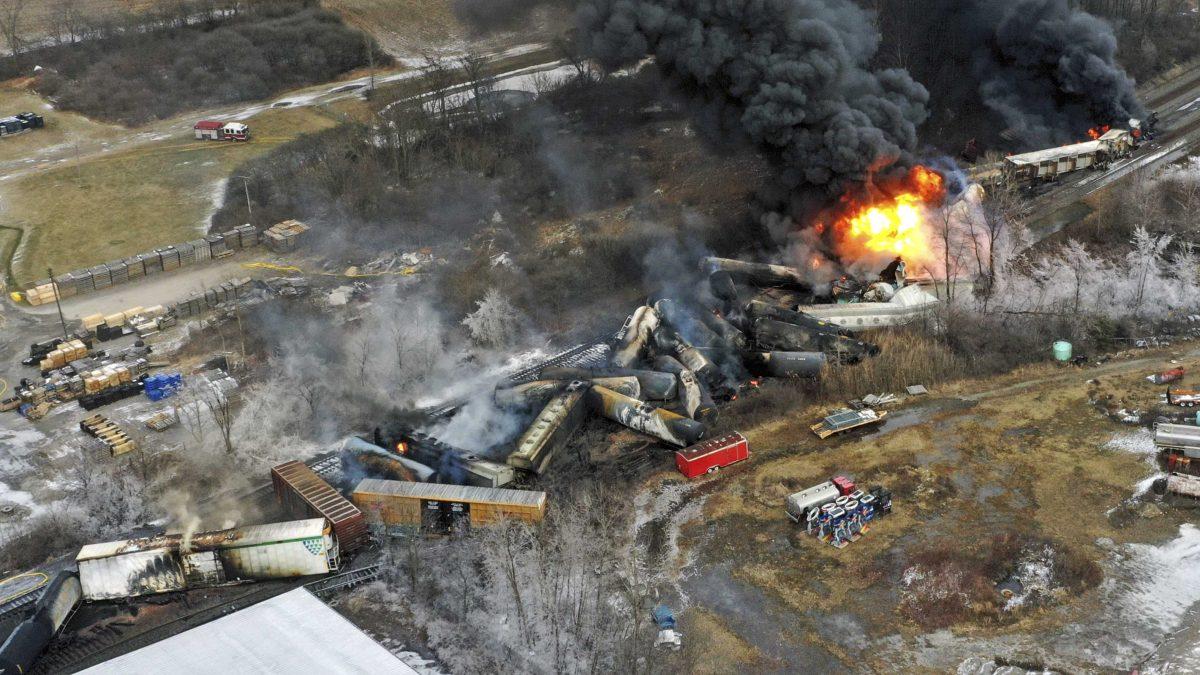Editor’s Note: The following column is satire.
The recent train derailment in East Palestine, Ohio, has raised questions about the need for regulations on the rail industry. Some argue that the government should place greater regulations on the handling of chemicals like vinyl chloride, which can be destructive to the local environment. However, more keen observers of the situation know that less regulation would lead to better outcomes.
The derailment resulted from an overheated roller bearing that went undetected for too long. National Train Safety Board Chairwoman Jennifer Homendy explained the cause of the derailment saying, “Roller bearings fail. But it’s critical for problems to be identified and addressed early so these aren’t run until failure.”
Proponents of regulation would call for the implementation of federal regulations that dictate the number of sensors required to pick up on potential issues. However, this solution is rendered unnecessary by the real answer to the problem: better train conductors.
The best jockeys know their horses. Based on how the horse is running, they can often tell if there’s a problem. Train conducting is no different, and it’s laughable that the conductor of the derailed train in Ohio has avoided criticism.
In any sport, the greatest players can anticipate the coming moments so well that they almost seem to have traveled backward in time to take advantage of their knowledge of the future. Train conductors need to build that awareness; they simply aren’t looking ahead, and it’s a crime that we continue to coddle them with regulations.
There should be no regulations on sensors, and, if possible, they should be removed entirely. It’s time to take the training wheels off and expect more from conductors.
Calls for regulation come from bad-faith actors who resent large corporations. They won’t stop until the government is involved in every aspect of corporate life. Oddly, these same people often call for civil rights for marginalized people. These bleeding hearts must have forgotten the idea of corporate personhood: Legally, corporations are considered to be individuals in many different settings.
Discrimination against corporations is morally equivalent to any other kind of hateful discrimination. Criticizing corporations should be viewed in the same light as protesting the integration of public schools or campaigning against women’s suffrage.
Calling for regulations on corporations is tantamount to violence against them. If they were forced to make sure that their operations were safe, how would executives find a way to give themselves bonuses while laying off giant swaths of their workforce? It’s simply unfair.
Even granting the far-fetched premise that increasing regulation leads to increased safety, the supporters of regulation should ask themselves a question. What’s the worst that could happen? Alarmists have compared the fallout from the derailment to the Chernobyl disaster. They seem to be ignoring the possibility that the effects of these events could lead to the creation of super soldiers that will be useful in the inevitable third world war.
This line of thinking may be viewed as conspiratorial, but perhaps it’s not a coincidence that the derailment took place in East Palestine, Ohio. The location brings Israel into question.
Our ally in the Middle East may have gotten confused and accidentally sent a covert chemical attack to the wrong Palestine. For evidence, see the lack of hospital bombings in Gaza. This could be due to the Israel Defense Forces thinking that they had already sent an attack.
Reducing the issue of train derailment to one of regulation is small minded. America would be better off carefully considering all possible angles of this issue before acting.
Frank Kidd is a 22-year-old mass communication major from Springfield, Virginia.
Opinion: Overregulation is the real culprit in Ohio toxic train disaster
By Frank Kidd
March 2, 2023
FILE – In this photo taken with a drone, portions of a Norfolk Southern freight train that derailed the previous night in East Palestine, Ohio, remain on fire at mid-day on Feb. 4, 2023. Transportation Secretary Pete Buttigieg announced a package of reforms to improve safety Tuesday, Feb. 21 — two days after he warned the railroad responsible for the derailment, Norfolk Southern, to fulfill its promises to clean up the mess just outside East Palestine, and help the town recover. (AP Photo/Gene J. Puskar, File)







